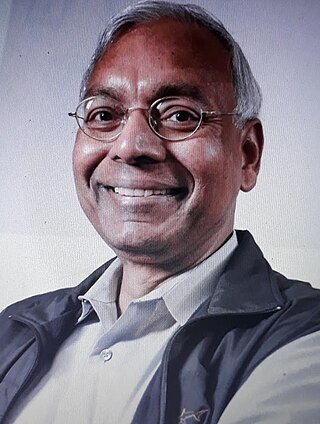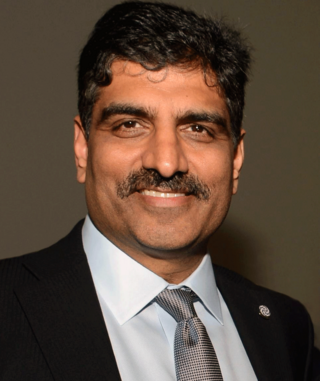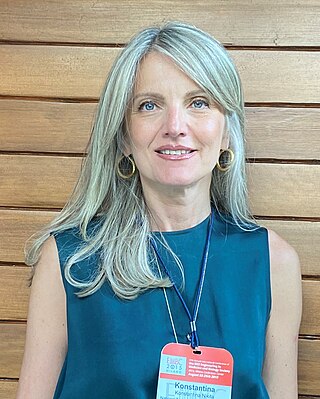
Thomas Shi-Tao Huang was a Chinese-born American computer scientist, electrical engineer, and writer. He was a researcher and professor emeritus at the University of Illinois at Urbana-Champaign (UIUC). Huang was one of the leading figures in computer vision, pattern recognition and human computer interaction.

Rosalind Wright Picard is an American scholar and inventor who is Professor of Media Arts and Sciences at MIT, founder and director of the Affective Computing Research Group at the MIT Media Lab, and co-founder of the startups Affectiva and Empatica.

Linda G. Shapiro is a professor in the Department of Computer Science and Engineering, a professor of electrical engineering, and adjunct professor of Biomedical Informatics and Medical Education at the University of Washington.
Bir Bhanu is the Marlan and Rosemary Bourns Endowed University of California Presidential Chair in Engineering, the Distinguished Professor of Electrical and Computer Engineering, and Cooperative Professor of Computer Science and Engineering, Mechanical Engineering and Bioengineering, at the Marlan and Rosemary Bourns College of Engineering at the University of California, Riverside (UCR). He is the first Founding Faculty of the Marlan and Rosemary Bourns College of Engineering at UCR and served as the Founding Chair of Electrical Engineering from 1/1991 to 6/1994 and the Founding Director of the Center for Research in Intelligent Systems (CRIS) from 4/1998 to 6/2019. He has been the director of Visualization and Intelligent Systems Laboratory (VISLab) at UCR since 1991. He was the Interim Chair of the Department of Bioengineering at UCR from 7/2014 to 6/2016. Additionally, he has been the Director of the NSF Integrative Graduate Education, Research and Training (IGERT) program in Video Bioinformatics at UC Riverside. Dr. Bhanu has been the principal investigator of various programs for NSF, DARPA, NASA, AFOSR, ONR, ARO and other agencies and industries in the areas of object/target recognition, learning and vision, image/video understanding, image/video databases with applications in security, defense, intelligence, biological and medical imaging and analysis, biometrics, autonomous navigation and industrial machine vision.

Anil Kumar Jain is an Indian-American computer scientist and University Distinguished Professor in the Department of Computer Science & Engineering at Michigan State University, known for his contributions in the fields of pattern recognition, computer vision and biometric recognition. He is among the top few most highly cited researchers in computer science and has received various high honors and recognitions from institutions such as ACM, IEEE, AAAS, IAPR, SPIE, the U.S. National Academy of Engineering, the Indian National Academy of Engineering and the Chinese Academy of Sciences.

Fei-Fei Li is a Chinese-American computer scientist, known for establishing ImageNet, the dataset that enabled rapid advances in computer vision in the 2010s. She is the Sequoia Capital professor of computer science at Stanford University and former board director at Twitter. Li is a co-director of the Stanford Institute for Human-Centered Artificial Intelligence and a co-director of the Stanford Vision and Learning Lab. She served as the director of the Stanford Artificial Intelligence Laboratory from 2013 to 2018.

Venu Govindaraju is an Indian-American whose research interests are in the fields of document image analysis and biometrics. He presently serves as the Vice President for Research and Economic Development. He is a SUNY Distinguished Professor of Computer Science and Engineering, School of Engineering and Applied Sciences at the University at Buffalo, The State University of New York, Buffalo, NY, USA.
Larry S. Davis is an American computer scientist and professor emeritus at the University of Maryland, College Park. He currently works as a Senior Principal Scientist at Amazon. Davis is best known for his research in the field of computer vision.

Theodosios Pavlidis is a computer scientist and Distinguished Professor Emeritus of Computer Science at the State University of New York, Stony Brook.

René Vidal is a Chilean electrical engineer and computer scientist who is known for his research in machine learning, computer vision, medical image computing, robotics, and control theory. He is the Herschel L. Seder Professor of the Johns Hopkins Department of Biomedical Engineering, and the founding director of the Mathematical Institute for Data Science (MINDS).
Sudeep Sarkar is a professor and chairman of the Department of Computer Science and Engineering at the University of South Florida, Tampa. He was named Fellow of the Institute of Electrical and Electronics Engineers (IEEE) in 2013 for contributions to computer vision.
Matthew Turk is the President of the Toyota Technological Institute at Chicago, and a professor emeritus and former department chair of the Department of Computer Science and the Media Arts and Technology Program at the University of California, Santa Barbara, California. He was named a Fellow of the Institute of Electrical and Electronics Engineers (IEEE) in 2013 for his contributions to computer vision and perceptual interfaces. In 2014, Turk was also named a Fellow of the International Association for Pattern Recognition (IAPR) for his contributions to computer vision and vision based interaction. In January 2021, he was named a Fellow of the Association for Computing Machinery (ACM) for contributions to face recognition, computer vision, and multimodal interaction. he was named a Fellow of the Association for Computing Machinery (ACM) for contributions to face recognition, computer vision, and multimodal interaction. Matthew Turk served in the Steering Committee of ACM International Conference on Multimodal Interaction between 2002-2015, and chaired the committee between 2007-2009 and received the ICMI Community Service Award in 2014.

Maja Pantić is a Professor of Affective and Behavioural Computing at Imperial College London and an AI Scientific Research Lead in Facebook London. She was previously Professor of Affective and Behavioural Computing University of Twente and Research Director of the Samsung AI lab in Cambridge, UK. She is an expert in machine understanding of human behaviour including vision-based detection and tracking of human behavioural cues like facial expressions and body gestures, and multimodal analysis of human behaviours like laughter, social signals and affective states.
Tin Kam Ho is a computer scientist at IBM Research with contributions to machine learning, data mining, and classification. Ho is noted for introducing random decision forests in 1995, and for her pioneering work in ensemble learning and data complexity analysis. She is an IEEE fellow and IAPR fellow.

Gang Hua is a Chinese-American computer scientist who specializes in the field of computer vision and pattern recognition. He is an IEEE Fellow, IAPR Fellow and ACM Distinguished Scientist. He is a key contributor to Microsoft's Facial Recognition technologies.
Jiebo Luo is a Chinese-American computer scientist, the Albert Arendt Hopeman Professor of Engineering and Professor of Computer Science at the University of Rochester. He is interested in artificial intelligence, data science and computer vision.

Josiane Zerubia is a French research scientist. She is the Director of Research at INRIA (DRCE), Université Côte d'Azur. Dr. Zerubia has made pioneering research contributions. She has been the Principal Investigator of numerous projects like of the Ayin (2012-2016), the Ariana (1998-2011) and of the Pastis (1995-1997). Presently, she is leading as head of the Ayana exploratory project (2020-2023). She has been professor (PR1) at SUPAERO (ISAE) in Toulouse since 1999.

Konstantina "Nantia" Nikita is a Greek electrical and computer engineer and a professor at the School of Electrical and Computer Engineering at the National Technical University of Athens (NTUA), Greece. She is director of the Mobile Radiocommunications Lab and founder and director of the Biomedical Simulations and Imaging Lab, NTUA. Since 2015, she has been an Irene McCulloch Distinguished Adjunct Professor of Biomedical Engineering and Medicine at Keck School of Medicine and Viterbi School of Engineering, University of Southern California.

Aleksandra (Saška) Mojsilović is a Serbian-American scientist. Her research interests are artificial intelligence, data science, and signal processing. She is known for innovative applications of machine learning to diverse societal and business problems. Her current research focuses on issues of fairness, accountability, transparency, and ethics in AI. She is an IBM Fellow and IEEE Fellow.
Yingli Tian is a Chinese-American electrical engineer known for her research applying image processing to the analysis of facial expressions and their meanings. Her more recent research has focused on assistive technology including the automated recognition of sign language. She is CUNY Distinguished Professor in the Department of Electrical Engineering at the City College of New York.













